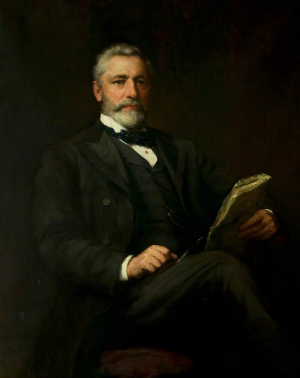Baptist, entrepreneur and philanthropist
Sir Edward Wood was a former mayor of Leicester and prominent Baptist. The money he left in a trust fund following his death in 1917 is still being distributed today. Erica Statham takes up his story
 Sir Edward Wood was born in Janurary 1839 and died in September 1917. He was a four-time Mayor of Leicester, a county magistrate, and vice chairman of the Derwent Valley Water Board (an organisation that ensured a continuous supply of good quality water to the citizens of Leicester: indeed the reservoirs built during Sir Edward’s time are still in use today.) Under his guidance as a benefactor of the Leicester Royal Infirmary, a nurses’ home and children’s hospital were built.
Sir Edward Wood was born in Janurary 1839 and died in September 1917. He was a four-time Mayor of Leicester, a county magistrate, and vice chairman of the Derwent Valley Water Board (an organisation that ensured a continuous supply of good quality water to the citizens of Leicester: indeed the reservoirs built during Sir Edward’s time are still in use today.) Under his guidance as a benefactor of the Leicester Royal Infirmary, a nurses’ home and children’s hospital were built.
Despite this impressive record he was perhaps even more well-known and respected as a local entrepreneur: he rose to become the first managing director of the Leicester boot and shoe manufacturer and retailer Freeman Hardy and Willis, a company which had outlets up and down the country until relatively recently.
Edward Wood came from Derby. His father William Wood was an engine driver. Edward left school at 10 and in 1850 the family moved to Leicester. Edward started work as a printer, apprenticed to Thomas Cook and then later to William Baines, the hosier and outfitter who had a shop in the Market Place in Leicester.
Both employers were prominent Baptists and it is probable that at this time Edward started to attend Friar Lane Baptist church where he taught in the Sunday school. Later he moved to Victoria Road Baptist Church where he became a prominent leader, serving as a deacon until his death.
In 1861 he married Annie Sewell from Uppingham, declaring in an interview in a local newspaper that he ‘believed in early marriages, starting his housekeeping on modest means, (having only earned £10 per annum in the final two years of his apprenticeship), but nevertheless always managing to save something.'
Annie and Edward had three daughters. After the death of her mother in 1907, the eldest Emma acted as mayoress and helped her father to continue with his mayoral duties .
After working for Mr Baines, Edward joined a Mr Pickering and a Mr Statham in a Boot and Shoe manufacturing business in Marble St, Leicester. The factory building still stands today. Afterwards he set up his own boot and shoe business, going on the road as a travelling salesman. He sold this business to the already established Freeman Hardy and Willis.
Later he joined the company as an employee and worked his way up. He was described, on his retirement around 1913, as ‘a captain of industry, a merchant prince; an organiser of business, bold and intrepid; in enterprise a Midas, he created wealth that all could benefit from and he provided good wages and equitable terms of employment; in its early days the Co-operative movement had much to thank him for, particularly the Boot and Shoe side. He was often consulted in those days as to how they should obtain a permanent footing in the town’s industry.’
Alderman North, a fellow Liberal, described him as having a kind and generous nature, a warm heart, was a warm friend and a sympathetic supporter.
Sir Edward saw the outbreak of WW1 but sadly not its conclusion and heartbreakingly his only grandson Robert was killed on the Somme in 1916 on the last day of fighting.
Sir Edward served his community well and in death continued to do so, setting up a number of trusts and charities under his will. One of them was the Sir Edward Wood Bequest Fund for distressed gentlewomen. In order to qualify you needed to be female, over 55, a member of a non-conformist protestant church and have occupied a good social position within the local community. Of course be in distress. Five thousand pounds was invested in 1917 and returned good dividends.
Although the dividends went up, over the year the applicants, not surprisingly, went down. A couple of years ago it was decided with the permission of the charity commissioners to wind up the Trust, re-defining some of the terms of the bequest while still keeping within the spirit of Sir Edwards intentions.
This has enabled the trustees to distribute the outstanding moneys more effectively, and has resulted in a number of substantial donations being made to Leicester and Leicestershire non-conformist organisations.
Picture: Walter William Ouless (1848–1933) / Photo credit Leicester Arts and Museums
By Erica Statham, a trustee of the Sir Edward Wood Trust
Baptist Times, 16/08/2016